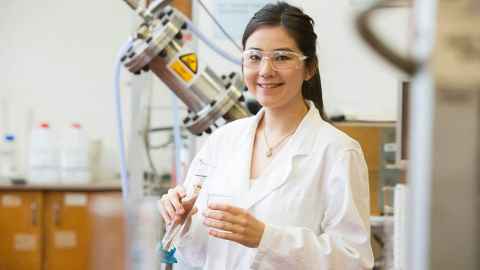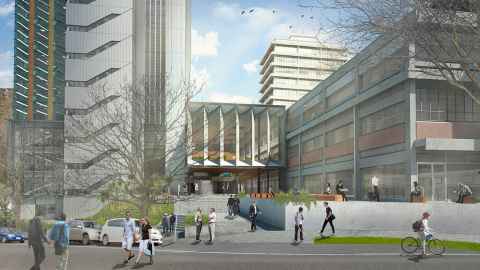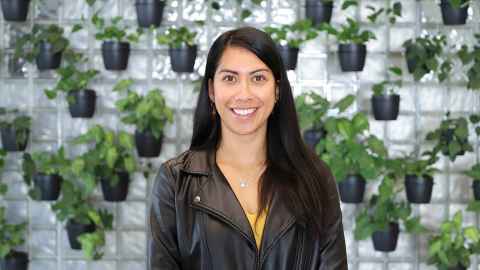Faculty Focus: Engineering
Creating a diverse engineering environment

The Faculty of Engineering has recently launched the Women in Engineering 33% project, which is committed to creating a more diverse learning environment.
With the help of Fisher & Paykel Healthcare, Mercury, and Tonkin & Taylor, we are focused on increasing the proportion of first-year female enrolments. Our aim is at least 33% in the near term and eventually parity. Representatives from these key partners joined us at a recent launch event. They reiterated how a project such as this impacts the world’s future as these students graduate and find careers in engineering.
We are excited to announce that this year’s cohort of first-year students is already 29% female. Although the Dean of Engineering, Professor Nic Smith, would like the number to be even higher. “We have a really vibrant, energetic and talented cohort of female students, and have seen significant growth in the previous five years.”
“We run an annual Dean’s Leadership Programme for 40 undergraduate students, based on academic ability, contribution outside the faculty and their potential as future leaders. Last year, 55% of participants were female.”
One of our main initiatives is outreach to high school students. There are several programmes where our current female students are engaging with secondary school students. For instance, there’s a tutoring programme to assist with the maths and physics grades needed for admission to the faculty.“
Working with these young women gives school students the opportunity to identify with talented engineers and see the success and fun they’re having.
“It gives groups of students the chance to connect with the faculty, and the confidence to apply for a Bachelor of Engineering.”
Our Women in Engineering Adviser, Naomi Fleming, is also working with staff and students to expand the scope of our in-house programmes. This year there will be two Enginuity Day events, and two Engineer her Future information evenings, both of which are aimed at female high-school students. Enginuity Day has been running since 1998 and remains an important opportunity for prospective students to try Engineering hands-on.
As technology continues to change, there’s a broader view of what engineering is, and a greater understanding of its impact. “There’s potential for exciting technology, combined with the challenge of determining how it can best change people’s lives. That seems to be appealing to more women.” Environmental and Biomedical Engineering for example are relevant to everyone’s lives. Both of these areas bring a realisation that technology, when it comes to climate change or health, is part of the solution but also part of the problem.
With our industry sponsors and a growing list of outreach efforts aimed at young women, we’re confident we can continue to create a student cohort – and consequently an industry – that’s balanced and diverse.
Building 405

The Faculty of Engineering is excited to share a progress update on Building 405. The brand new facility will be ready for undergraduates joining us in 2020.
It’s purpose-built for the faculty’s needs, offering 25 multi-disciplinary learning spaces, over 50 specialist research laboratories and a range of student spaces designed to encourage collaboration. Larger areas with comfortable furniture for relaxing and socialising will be complemented by smaller breakout spaces, where our students can study solo or with a group.
The 11-storey building will be home to over 10,000 existing pieces of equipment that will be moved in from the other campuses. A further $5 million has been spent on more than 700 new pieces of equipment to support the new labs and teaching spaces.
Graduate Profile: Cara Berghan

Career: Graduate Electrical Engineer at WSP Opus
Programme: Bachelor of Engineering (Honours) specialising in Electrical Engineering
“My usual day-to-day role is as a Graduate Electrical Engineer for WSP Opus, but recently I’ve been doing Systems Engineering as part of an alliance for the City Rail Link project. At the moment my day is built around dealing with design leads to try and understand all the aspects of their work and what they will be delivering at each stage of the project. I make sure that the designers are aware of the minimum requirements set by the client, and develop a list of system requirements applicable to the design packages for teams to work towards.
“In my role as a Graduate Electrical Engineer, I was involved with the Whangarei V Category LED retrofit. Essentially that was redesigning Whangarei’s whole street lighting network with LEDs, which was a massive body of work and took almost a year.
“In Engineering, you learn to work with large groups of people from different backgrounds. They have different perspectives and different understanding of the brief. It’s very interesting in that you learn a lot from other people as you explore the problem itself. Your idea of what you’ve been sent in there to learn is completely different to what you end up learning.
“I would love to see more women in Engineering. In such a rapidly developing world, and particularly being involved in engineering projects that have the power to influence the way we live in the future. It’s important that we have a diverse range of voices, because the right people can help you open up and tap into your skillset better.”